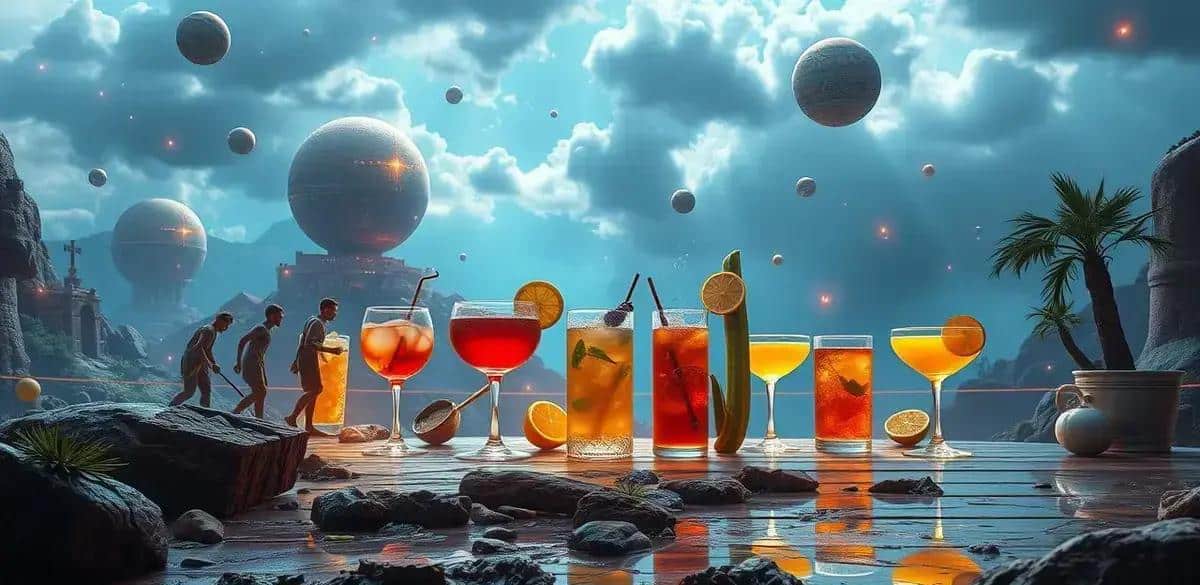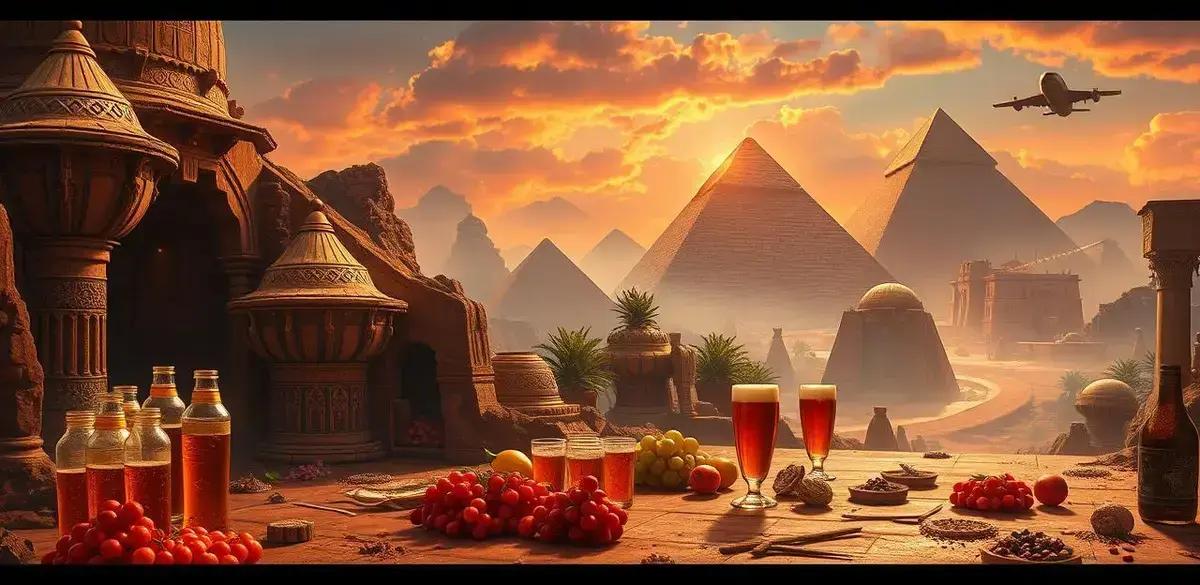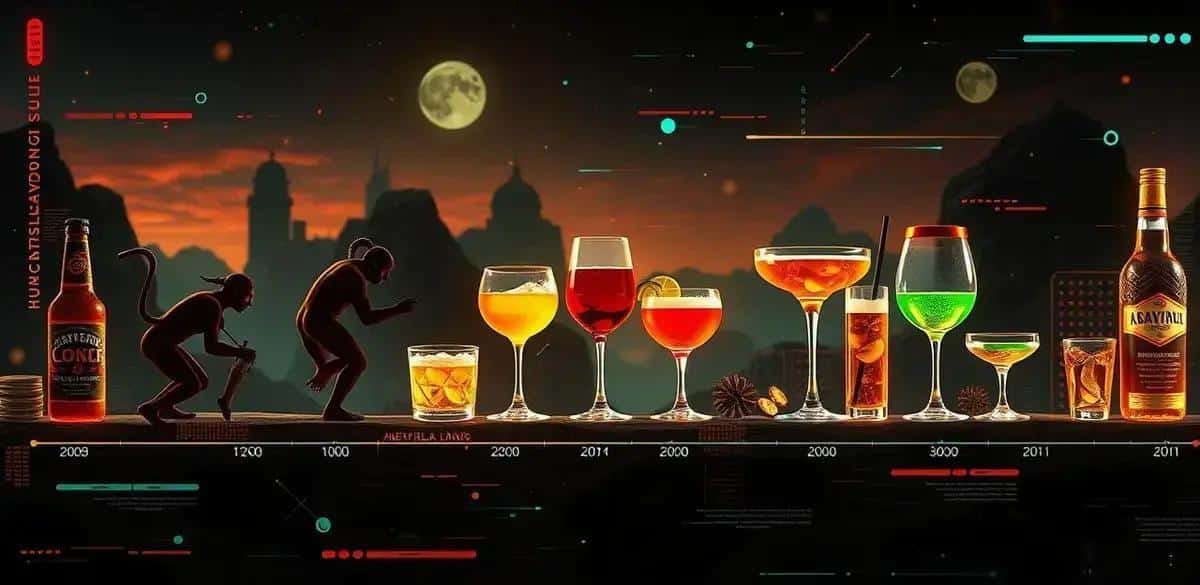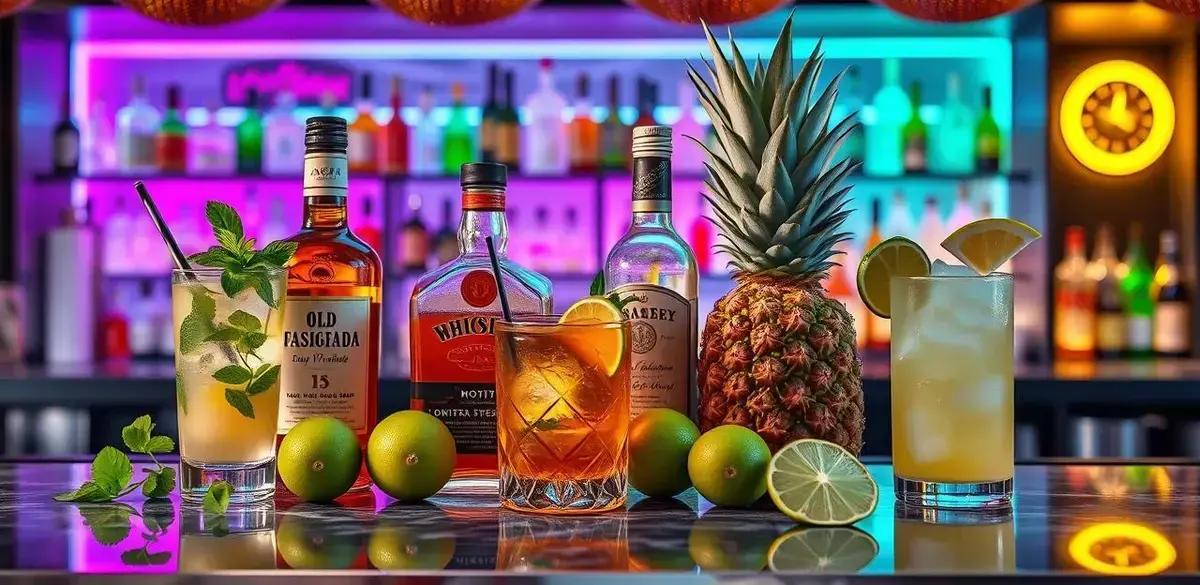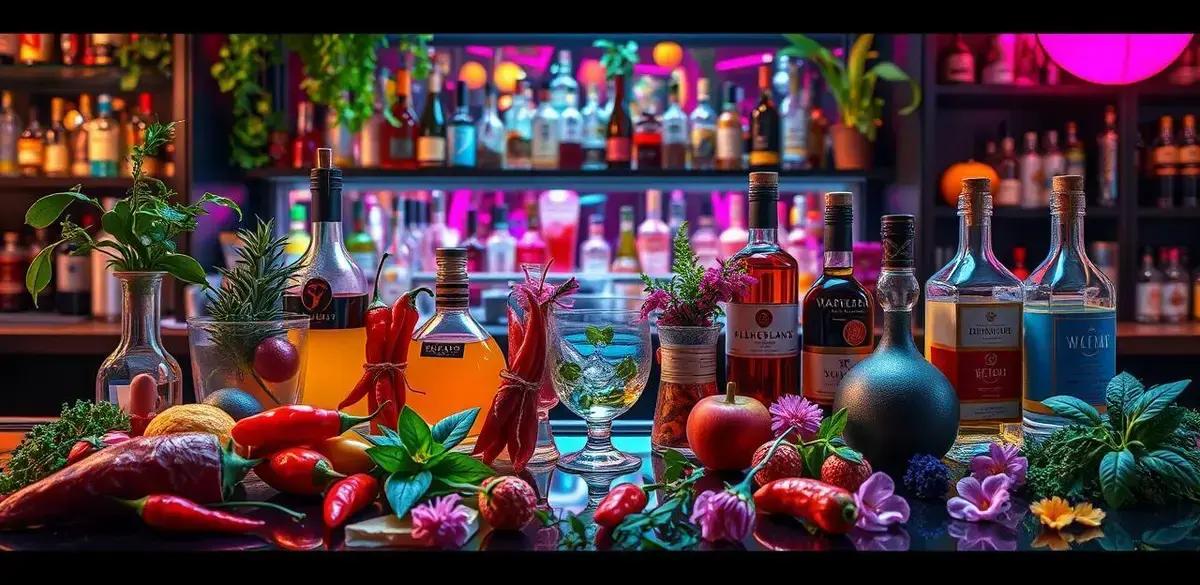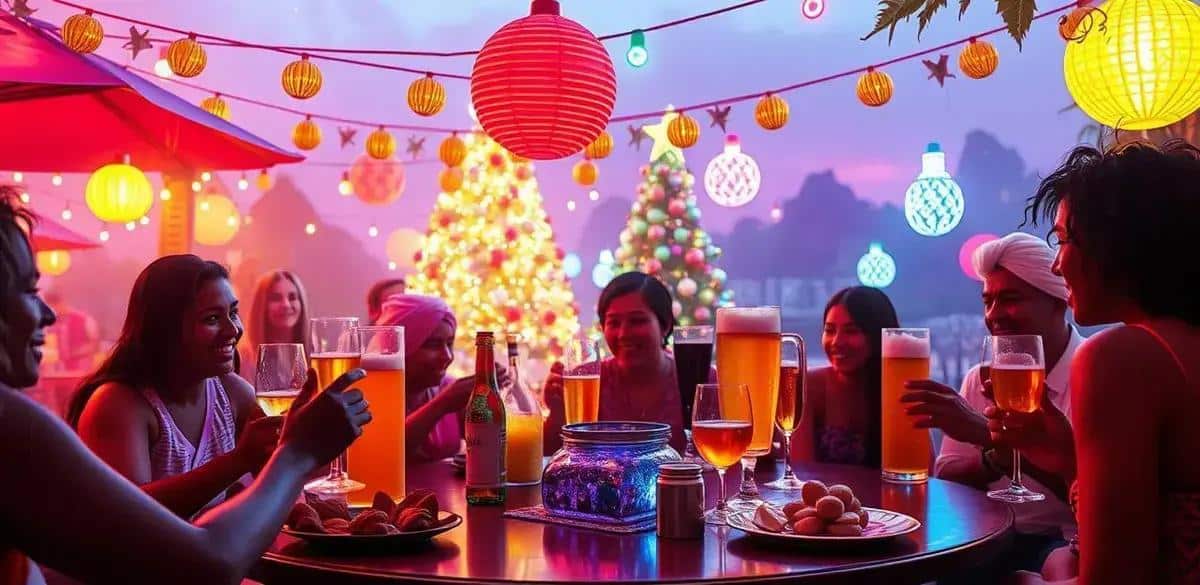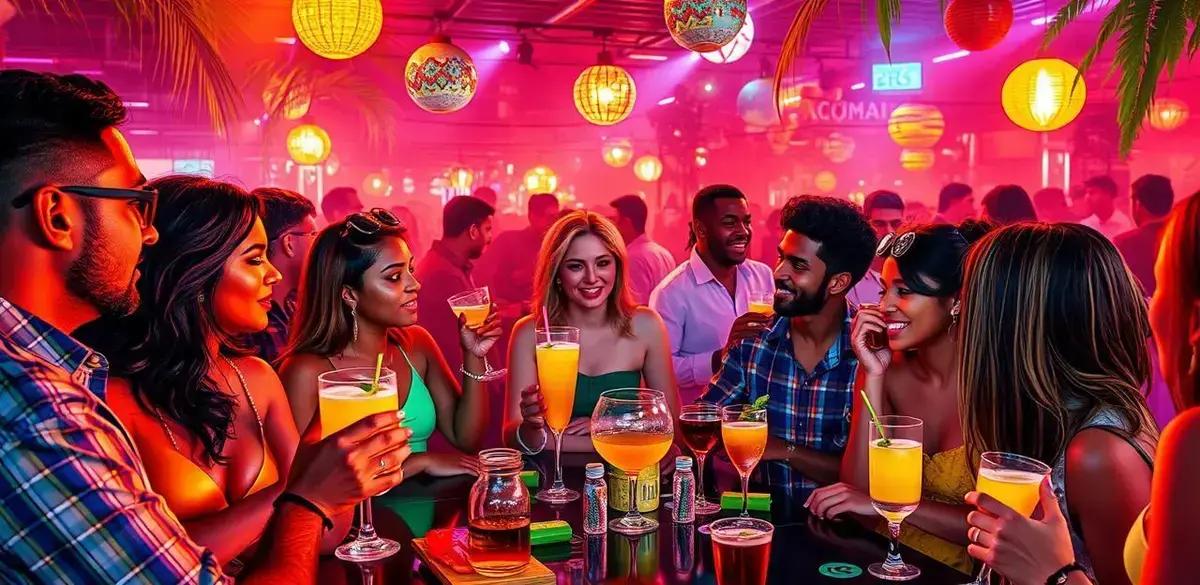The History of Drinks and recipes of classic drinks in Brazil showcase diverse flavors and cultural significance. Popular drinks like Caipirinha and Mojito enhance social interactions at gatherings, celebrations, and rituals, connecting people through shared experiences and traditions.
The History of drinks is a fascinating journey that takes us through time, exploring how different cultures have influenced our favorite beverages. From ancient brews to modern cocktails, drinks have always played a pivotal role in social gatherings and celebrations. In this post, we will delve into the origins of various drinks, their evolution and the unique ingredients that make them special.
Summary
- 1 History of Drinks: The Ancient Origins of Beverages
- 2 History of Drinks: Evolution of Alcoholic Drinks Through History
- 3 Recipe Ingredients for Classic Cocktails
- 4 Preparation Method for Iconic Drinks
- 5 Recipe Curiosities: Uncommon Ingredients in Beverages
- 6 The Role of Drinks in Cultural Celebrations
- 7 How Drinks Have Shaped Social Interactions
- 8 Cheers to Your Cocktail Journey!
- 9 FAQ – Frequently Asked Questions About Drinks and Cocktails
- 9.1 What are the most popular classic drinks in Brazil?
- 9.2 How can I create the perfect cocktail at home?
- 9.3 What are some uncommon ingredients I can use in cocktails?
- 9.4 Why are drinks important in social interactions?
- 9.5 How do I choose the right drink for an occasion?
- 9.6 Can I make cocktails without alcohol?
History of Drinks: The Ancient Origins of Beverages
The ancient origins of beverages trace back thousands of years, revealing the incredible journey of humanity’s first drinks. Early civilizations created basic fermented drinks using grains and fruits. For example, beer has been produced since around 7,000 BC in ancient Mesopotamia, where Sumerians used barley to create one of the world’s oldest drinks.
The Discovery of Fermentation
Humans discovered fermentation by accident when fruits were left exposed, resulting in natural fermentation. This not only led to alcohol but also to the realization that some fermented drinks could be safe to consume. The Egyptians and Chinese later refined this process, introducing new ingredients and techniques.
Early Recipes and Ingredients
Ingredients like honey, herbs, and various fruits became critical in crafting early beverages. Mead, made from honey and water, is one of the oldest alcoholic drinks, first appearing around 3,000 BC. Rice wine dates back to 7000 BC in China, showcasing the diverse origins of drinks.
Social and Cultural Roles
Drinks served not only as nourishment but also played a significant role in social and cultural rituals. Various ancient cultures incorporated beverages into celebrations, religious rites, and communal gatherings. For instance, the Sumerians had beer festivals, and the Chinese used rice wine during important ceremonies.
Tradition Continues
From these humble beginnings, the art of beverage crafting evolved. Today, these ancient recipes and the traditional methods of preparation still influence many of our modern drinks. The legacy of our ancestors continues to enrich the cultural significance of beverages around the world, making them integral to various ceremonies and celebrations.
History of Drinks: Evolution of Alcoholic Drinks Through History
The evolution of alcoholic drinks has a rich and fascinating history that reflects cultural advancements and changing tastes over time. Starting in ancient civilizations, fermentation processes were discovered, leading to the production of early alcoholic beverages. Sumerians crafted beer around 5,000 BC, and Egyptians improved recipes with added spices and flavors.
Middle Ages to Renaissance
During the Middle Ages, brewing became an essential trade in Europe. Monasteries took on brewing practices, enhancing methods and quality. By the Renaissance, the production of wines and spirits began to flourish, resulting in the rise of popular drinks like brandy and whiskey.
The Industrial Revolution
The Industrial Revolution marked a significant turn in beverage production. Advances in technology improved distillation methods, leading to higher quality alcoholic drinks. The 18th century saw an explosion of cocktails and mixed drinks, with bartending becoming a recognized profession.
20th Century Prohibition Era
The early 20th century brought challenges with the Prohibition Era in the United States. Despite the ban on alcohol, underground speakeasies emerged, preserving the culture of cocktails. This era greatly influenced drink recipes, creating classics like the Old Fashioned and Mint Julep.
Modern Innovations
Today, the craft cocktail movement has revived interest in high-quality ingredients, artisanal spirits, and creative mixology. Bartenders experiment with unique flavors, local ingredients, and new techniques, leading to an exciting variety of drinks.
Global Influence
The globalization of cocktail culture has made international drinks popular. From the Caipirinha in Brazil to the Mojito in Cuba, diverse influences shape the landscape of alcoholic beverages worldwide. Classic drinks continue to evolve, adapting to modern tastes while honoring their historical roots.
Recipe Ingredients for Classic Cocktails
When preparing classic cocktails, it is essential to have the right ingredients. Each drink has its unique flavor profile, making ingredient selection crucial for achieving the perfect taste. Here are some of the ingredients needed for popular classic cocktails:
Mojito
For the refreshing Mojito, you will need:
- 2 oz white rum
- 1 oz fresh lime juice
- 2 teaspoons sugar
- 6-8 fresh mint leaves
- Club soda
- Ice
Caipirinha
The traditional Brazilian Caipirinha requires:
- 2 oz cachaça
- 1 lime, cut into wedges
- 2 teaspoons sugar
- Ice
Old Fashioned
To create the timeless Old Fashioned, gather:
- 2 oz bourbon or rye whiskey
- 1 sugar cube
- 2-3 dashes Angostura bitters
- Ice
- Orange twist for garnish
Daiquiri
The classic Daiquiri consists of:
- 2 oz white rum
- 1 oz fresh lime juice
- 3/4 oz simple syrup
- Ice
Martini
For a sophisticated Martini, you will require:
- 2 oz gin (or vodka for a Vodka Martini)
- 1/2 oz dry vermouth
- Ice
- Olive or lemon twist for garnish
Piña Colada
To whip up a tropical Piña Colada, use:
- 2 oz light rum
- 1 oz coconut cream
- 1 oz heavy cream
- 6 oz fresh pineapple juice
- Ice
Having these ingredients on hand will allow you to craft these classic cocktails with ease. Each recipe highlights traditional flavors while offering a taste of cultural history.
Preparation Method for Iconic Drinks
Preparing iconic drinks requires attention to detail and the right techniques. Here are the preparation methods for some beloved classic cocktails from Brazil:
Mojito
To make a refreshing Mojito:
- In a glass, muddle the mint leaves with sugar and lime juice to release the mint oils.
- Add the white rum and fill the glass with ice.
- Top with club soda and stir gently.
- Garnish with a sprig of mint and a lime wedge.
Caipirinha
To craft an authentic Caipirinha:
- Place the lime wedges in a glass and sprinkle sugar on top.
- Muddle the lime and sugar together to release the juices.
- Add cachaça and fill the glass with ice.
- Stir well to combine all ingredients.
Old Fashioned
For a timeless Old Fashioned cocktail:
- Place the sugar cube in a glass and add Angostura bitters.
- Muddle the sugar and bitters until the sugar dissolves.
- Add the whiskey and a large ice cube.
- Stir gently to chill the drink.
- Garnish with an orange twist or cherry.
Daiquiri
To prepare a classic Daiquiri:
- In a shaker, combine the rum, lime juice, and simple syrup.
- Add ice and shake vigorously until chilled.
- Strain the mixture into a chilled cocktail glass.
Martini
To mix a classic Martini:
- In a mixing glass filled with ice, pour the gin (or vodka) and vermouth.
- Stir for about 30 seconds to chill.
- Strain the mixture into a chilled martini glass.
- Garnish with an olive or lemon twist.
Piña Colada
To blend a tropical Piña Colada:
- In a blender, combine the rum, coconut cream, heavy cream, pineapple juice, and ice.
- Blend until smooth and creamy.
- Pour into a chilled glass and garnish with a pineapple slice and cherry.
These preparation methods are key to enjoying the full flavor and experience of these classic cocktails, connecting drinkers to the rich history behind them.
Recipe Curiosities: Uncommon Ingredients in Beverages
Exploring uncommon ingredients in beverages can lead to exciting and unique flavor experiences. Here are some intriguing ingredients that have made their way into classic cocktails:
Chili Peppers
Incorporating chili peppers into cocktails adds heat and depth. Chili-infused spirits, like tequila or vodka, can elevate drinks such as the Spicy Margarita or Bloody Mary.
Herbs and Spices
Fresh herbs, such as basil, rosemary, and thyme, can transform a drink’s profile. Adding muddled herbs in cocktails enhances aroma and flavor. For example, a rosemary-infused gin can provide a refreshing twist on a classic gin and tonic.
Floral Elements
Ingredients like lavender, hibiscus, and elderflower can introduce floral notes to beverages. Hibiscus tea is popular in cocktails for its vibrant color and tart flavor, often used in drinks like Hibiscus Daiquiris.
Fruit Purees
Fruit purees, such as passion fruit or guava, can add richness and tropical flair to cocktails. These purees are often blended into drinks for smoothness and sweetness, making classics like the Pina Colada even more delightful.
Specialty Liqueurs
Using unique liqueurs, like Chartreuse or St. Germain, can create complex flavor profiles in cocktails. These liqueurs often have herbal or floral notes that make beverages stand out.
Bitters
Bitters play a crucial role in enhancing cocktail flavor. Varieties like orange bitters or aromatic bitters can deepen the taste of drinks, making them richer and more appealing. A dash of bitters in an Old Fashioned can be a game changer.
Experimenting with these uncommon ingredients can bring creativity to the mixology world, allowing for original and flavorful cocktails that honor classic traditions while introducing bold new tastes.
The Role of Drinks in Cultural Celebrations
Drinks play a significant role in cultural celebrations around the world. They are often symbolic and hold importance during various festivities. In many cultures, beverages are not just for enjoyment; they represent traditions, heritage, and community.
Brazilian Celebrations
In Brazil, drinks like Caipirinha and Guaraná are staples during festive occasions. At Carnaval, people celebrate with these refreshing beverages, which add to the vibrant atmosphere. The rich flavors of cachaça in a Caipirinha capture the essence of Brazilian culture.
Weddings and Family Gatherings
During weddings and family reunions, drinks symbolize love and connection. Traditional drinks such as champagne or sparkling wine are often used to toast the couple, highlighting the importance of celebrations in binding families and friends together.
Holiday Traditions
Holidays also bring unique drinks into the spotlight. For example, eggnog in the United States during Christmas signifies merriment and warmth. Similarly, in Mexico, ponche is prepared for family gatherings during the holiday season, featuring fruits and warm spices that embody the spirit of togetherness.
Religious Ceremonies
In many religious ceremonies, drinks are integral. For instance, during the Jewish Passover, wine is used in blessings and rituals, representing joy and celebration. These drinks often evoke deep spiritual significance and connection to traditions.
Cultural Festivals
Festivals celebrate cultural identity, and drinks often take center stage. In Oktoberfest in Germany, for instance, beer is not only consumed but celebrated, symbolizing community and shared culture. Local brews become a source of pride and identity.
Overall, beverages enhance cultural celebrations, connecting people to their roots and creating lasting memories. Whether it’s a toast at a wedding or a traditional drink during a holiday, these beverages weave the fabric of community and culture.
How Drinks Have Shaped Social Interactions
Drinks have always played a vital role in shaping social interactions. They serve as a medium through which people connect, communicate, and celebrate life’s moments. Here’s how beverages influence social dynamics:
Social Settings
Gatherings like parties, weddings, and festivals often revolve around drinks. Serving beverages allows hosts to create a welcoming atmosphere, uniting guests as they share in the experience of enjoying a mixed drink or local brew. Whether it’s a refreshing Caipirinha at a Brazilian barbecue or a glass of wine at a wedding, drinks facilitate connection.
Cultural Traditions
In many cultures, specific drinks carry tradition and meaning. Sharing drinks, such as sake in Japan or mate in Argentina, encourages bonding and deepens relationships. During ceremonies, these beverages symbolize unity and respect, enhancing social cohesion.
Conversation Starters
Ordering drinks at a bar or café often leads to conversations. The act of choosing and discussing favorite drinks creates opportunities for interaction, serving as an icebreaker among strangers. This can lead to friendships and networking, especially during happy hour.
Networking and Business
Business meetings frequently occur over drinks. Whether it’s coffee during a morning briefing or cocktails in the evening, sharing a drink can ease tension and foster open communication. Establishing rapport over drinks can strengthen professional relationships, influencing collaboration and trust.
Celebratory Rituals
Participants often toast with drinks to celebrate achievements and special occasions. The ritual of raising a glass instills a sense of camaraderie among attendees. Drinks like champagne are synonymous with celebrations, marking milestones in personal and professional life.
Flavor Adventures
Trying new and exotic drinks can enhance social exploration. Sharing unique cocktails or regional specialties allows friends to discover flavors together, creating lasting memories. Drinks become part of the adventure, deepening cultural appreciation and connection.
Overall, drinks are much more than refreshments; they shape our interactions and experiences, enriching social life and enhancing connections. Their presence reinforces cultural bonds and personal ties, making them essential to human experience.
Cheers to Your Cocktail Journey!
As we explore together the rich history and recipes of classic drinks, we hope you feel inspired to experiment with your own creations. Each drink tells a story, connecting us through flavors, traditions, and celebrations.
Thank you for joining us on this refreshing adventure! We invite you to stay connected and discover more about the world of beverages. Follow us on our social networks to keep up with the latest trends and tips on cocktails and drinks.
Don’t miss out on the fun! Join us at the Master of Drinks Portal for exciting recipes and engaging drink stories. Let’s raise our glasses together and celebrate the art of mixology!
FAQ – Frequently Asked Questions About Drinks and Cocktails
What are the most popular classic drinks in Brazil?
Some popular classic drinks in Brazil include Caipirinha, Mojito, Piña Colada, and Old Fashioned. Each drink has its unique flavor profile and cultural significance.
How can I create the perfect cocktail at home?
Creating the perfect cocktail at home involves using quality ingredients, following precise recipes, and practicing your mixing skills. Don’t be afraid to experiment with flavors!
What are some uncommon ingredients I can use in cocktails?
You can try using herbs like basil or rosemary, fruits like passion fruit or guava, and unique liqueurs such as Chartreuse or St. Germain to add a creative twist to your drinks.
Drinks facilitate connections and conversations in social settings. They play key roles in celebrations, gatherings, and even business meetings, enhancing the overall experience.
How do I choose the right drink for an occasion?
Consider the theme of the occasion, the preferences of the guests, and the setting. Classic cocktails often work well for formal events, while refreshing drinks are perfect for casual gatherings.
Can I make cocktails without alcohol?
Absolutely! There are many delicious mocktail recipes that use fresh juices, herbs, and creative mixers to provide a refreshing beverage experience without alcohol.
